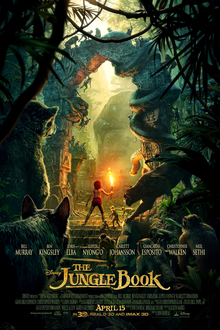
Resuming our run through of the Disney live action remakes, I was surprised that this was also directed by Jon Favreau. No wonder he was chosen for the later and higher profile The Lion King. I believe that The Jungle Book is the only one of the classic Disney animated features that I’d never watched and I’ve never read the Rudyard Kipling book it was based on either. Naturally it’s easy to guess at some of what it’s about through cultural sublimation but the details here were all new to me.
Mowgli is a human child who was found in the jungle by the panther Bagheera and given over to a pack of wolves to raise as one of their own. During a prolonged dry season when the animals all enforce a truce at the water hole, the tiger Shere Khan notices him. As he bears a grudge against all humans for scarring him with fire years ago, he vows to kill Mowgli. After the truce ends, the wolves deliberate over what to do as Shere Khan is much stronger than any of them. In order not to cause trouble to them, Mowgli decides to leave and Bagheera offers to guide him to the human village where he will be safe from the tiger. During the journey they are separated when the tiger attacks them and Mowgli meets with a number of other animals including the snake Kaa, the bear Baloo and the giant ape King Louie.
I’d praised The Lion King for its CGI and it seems that this was the trial run. It looks great of course albeit on a smaller scale but it’s notable to me that the newer film looks much better with its more realistic fur and more natural looking animations. It’s astounding how much of a difference a mere two to three years makes. There’s some music in this one as well but less of it and I feel that they’re not as emotionally affecting. As pure spectacle and entertainment, I suppose it’s okay but not as good as The Lion King. One aspect that is a bit interesting are the Indian roots of this story which lends a certain mysticism and a more overt fantasy feeling with elements like Kaa’s hypnotic powers and King Louie being a blatantly impossible creature. But I believe that this latest version actually tries to mute the Indian influence with Baloo and his quest for honey being a blatantly Western-type character.
A bigger disappointment is that this interpretation of the story has an incoherent, contradictory theme. It can’t even make up its mind over whether or not Mowgli should use fire. It shows him throwing away the torch, yet he wouldn’t have been able to defeat Shere Khan without it. It falls back on the wolves’ mantra of unity as its moralizing message, even though Baloo at first mocks it as being propaganda. But this is at odds with Mowgli learning that to succeed he must learn to be a man and not a wolf. It’s mixed messaging all the way down. Apparently in Kipling’s original version, he did use fire and because of that he is forced to leave the jungle and be a man. That’s an ending that makes a lot more sense but I suppose it’s too dark and too adult for Disney. My wife tells me that even the original animated film was more willing to go with an ending that contained some bittersweetness.
In the end, I’d rate this as being only mediocre, okay for being light and disposable entertainment, but inferior even to the new Lion King. This one fell off of the cultural radar fairly quickly after its release and deservedly so.